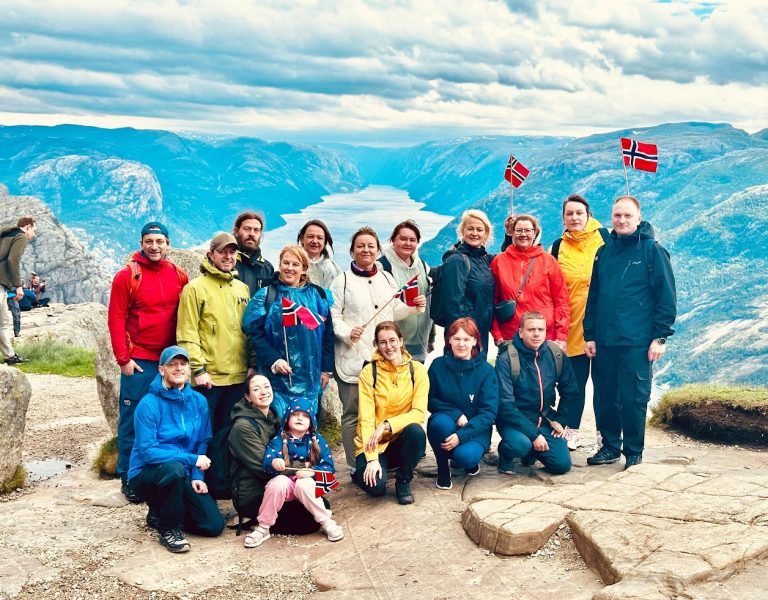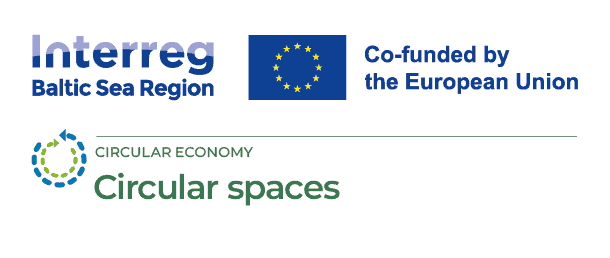Embracing Circularity
Highlights from the Circular Spaces Gathering at Creator Makerspace
A Collaborative Journey in Stavanger
On May 28 and 29, Creator Makerspace had the privilege of hosting an inspiring gathering of Circular Spaces partners in the vibrant city of Stavanger. This event was not just a meeting; it was a convergence of minds dedicated to fostering sustainability and innovation. Here, we share some of the highlights that made this event a resounding success.
Workshop: Building the Future of Circular Makerspaces
Our workshop sessions were a hive of activity and collaboration. Partners from Latvia, Lithuania, Denmark, Germany, and Norway came together to share experiences, brainstorm future project activities, and find inspiration for the next phase of our journey. The discussions were not just theoretical; they were grounded in practical, actionable insights. We left with a clear roadmap for transforming our spaces into circular hubs of creativity and sustainability.
Nature’s Inspiration: Hiking to Preikestolen
To infuse our collaborative efforts with fresh energy, we embarked on a hike to the iconic Preikestolen, also known as The Pulpit Rock. The breathtaking views and shared experiences during the hike created lasting memories and reinforced our bonds. It was a reminder of the natural beauty we strive to protect through our sustainable initiatives.

The Circular Spaces Project: A Vision for Sustainability
At the heart of our gathering was the Circular Spaces project, an ambitious initiative aiming to foster partnerships between makerspaces across the Baltic Sea region. Our focus is on eco-design and material reuse, pivotal elements in our quest for sustainability. Over the course of 27 months, we aim to enhance at least 15% of makerspaces in the Baltic Sea region to adopt circular business principles, transforming five out of an average of forty makerspaces.
One of the standout goals of the Circular Spaces project is the creation of a consortium of Baltic Sea region makerspaces. This consortium will collaborate on eco-design and material reuse, as well as develop a digital circular collaboration tool that boosts cooperation between makers and suppliers in the circular economy. Our aim is to train and involve at least 300 makers and startups in producing more circular products, and pilot at least five circular business ideas.
Addressing the Attitude-Behavior Gap
Despite the growing awareness of sustainability, many makerspaces are not as environmentally-oriented as often portrayed. This attitude-behavior gap – where makers claim to be green and resource-efficient but don’t reflect it in practice – poses a significant challenge. However, certain maker groups have a high potential to become sustainability advocates by adopting circular economy principles. These early adopters need easy access to information, practices, methods, and sustainable materials.
Supporting these makers with both intrinsic and extrinsic motivation is crucial. Providing knowledge, guiding methods, and tools can help bridge the attitude-behavior gap. Makerspaces, as bodies of collaborative learning and collective knowledge, can overcome various barriers and drive the movement towards sustainability.
Strengthening the Partnership
The Circular Spaces partnership consists of motivated organizations from five Baltic Sea region countries, including five makerspaces (one in a university), two business support organizations, and one county council. These partners bring their expertise, experience, and know-how to achieve the project’s goals and distribute results throughout the region. Each partner plays a vital role in the project, contributing to work packages and focusing on specific tasks.
Leveraging Expertise and Resources
The partnership’s composition allows for a diverse and comprehensive approach. Makerspaces will focus on their transformation into circular makerspaces, while business support organizations provide expertise and transfer solutions. The university partner will offer professional expertise in business models and processes, develop training programs, and pilot initiatives. Valmiera County Council will ensure project stability and management, allowing other partners to focus on outputs.
The partnership also covers a wide representation of regions and expertise. For example, partners from Latvia include strong cooperating makerspaces and organizations covering competitive regions. In Lithuania, business support organizations like Technology Park and Innovation Centre are poised to participate in international projects and develop future circular makerspaces.
A Decade of Maker Community Growth
Over the past decade, Europe has witnessed an unprecedented boom in maker communities. FabLabs, hackerspaces, and makerspaces are the physical representations of this movement, providing infrastructure and manufacturing equipment essential for turning ideas into reality. However, only a small fraction of makerspaces currently focus on environmental fields like eco-design or material reuse.
The Challenge and Opportunity
The main challenge for makerspaces in the Baltic Sea region is the significant attitude-behavior gap. While makers are aware of the need for green and sustainable development, their actions often don’t reflect this awareness. Makerspaces must lead by example, providing materials and equipment for repair, reuse, and eco-design. Introducing design thinking tools, methods, and programs can engage makers in the eco-maker movement.
The Value of Transnational Cooperation
Transnational cooperation allows project partners to tackle common challenges together, avoiding the need to “reinvent the wheel.” By exchanging experiences, knowledge, approaches, and skills, partners can find common solutions and generate new ideas. This cooperation enables the adaptation of successful practices from one country to another, enhancing the project’s impact.
A Comprehensive Partnership
The Circular Spaces partnership includes eight partners from Latvia, Lithuania, Denmark, Norway, and Germany. This cooperation will efficiently reach target groups and disseminate information throughout the Baltic Sea region and beyond. By working together, partners can develop and test innovative approaches to increase the number of environmentally-focused makerspaces.
Conclusion: Join the Movement
The Circular Spaces partners’ event marked a significant milestone in our journey towards sustainability. The insights gained and connections made have set a solid foundation for future collaborations and innovations. We are thrilled about the progress we’ve made and look forward to sharing more updates as we continue our transformative journey. Stay tuned for more exciting developments from Creator Makerspace and our partners in the Circular Spaces project. Together, we are building a sustainable future, one innovative idea at a time.
Join the Movement
Whether you’re a maker, an innovator, or someone passionate about sustainability, Creator Makerspace welcomes you. Explore our training programs, participate in our events, and become a part of a community dedicated to making a difference.


